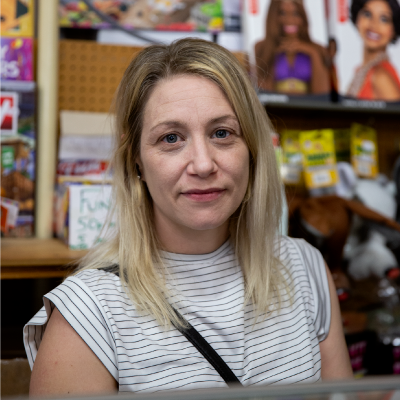"Payments is a rapidly developing and blossoming ecosystem which provides ever more convenient ways for us to pay and for retailers, customers, financial services and tech platforms to interact. This project really reminds us of the broader context and brings to life the multitude of reasons why cash remains so important to many people in the UK who would otherwise be left behind by the rapid transition to a low cash or cashless society." - Charles Buckworth, Partner
Physical cash has been a pivotal part of society for decades, but with the rapid development in digital technology and changes in customer behaviour, UK consumers and businesses are increasingly using plastic and digital money to pay. However, cash remains vital for many people in society and is particularly important for consumers with vulnerable characteristics and many small businesses.
The Financial Conduct Authority (FCA) has announced that new rules will come into force from 18 September 2024 which aim to address the cash access needs of consumers and businesses in local communities by requiring banks and building societies to assess and plug gaps in local cash provision. The move comes as more than 6,000 bank branches have closed over the past decade and customers increasingly switch to online or app-based banking.
RPC's Payments & Consumer Credit team is at the forefront of ensuring access to cash in the UK. For nearly a decade, RPC has worked closely with LINK, the UK’s ATM network, supporting its mission to provide millions of Britons access to more than £1.6bn in cash every week and in LINK's various access to cash initiatives.
In partnership with LINK and photojournalist, Bex Wade, we chatted with a range of individuals across the UK for whom cash remains important in their day-to-day lives. Their stories, featured below, offer a fascinating insight into the challenges of an increasingly cashless society and the importance of safeguarding access to cash.

Get in touch
Email usReal life stories
Seth is a 19-year-old student studying music at the University of Manchester who represents a growing number of young people resisting the cashless trend.
Seth finds security in tangible money, yet increasingly, he feels isolated on his own campus where cash is no longer accepted, from vending machines to the student union.

"All of the vending machines in the university are cashless, they're all contactless now. All of the food outlets on the campus, none of them accept cash. Nothing in the Students Union accepts cash, none of the music venues at the university accept cash. A lot of the cafes on the university are completely cashless. So it's a little difficult out there."
"[Cash] feels real, you know, there's a real gamification of consumerism going on with the whole paying for things as if it's nothing. It's all digitized. With cash, you know, you feel it in your hand, you can tell it's going."
"At uni I don't really carry any cards around except for my student ID and I use cash for basically everything – in shops, at pubs, cafes. It's just the way I go about things. If there's a homeless person, you can give them a bit of spare cash so they can get a room for the night. If you're tipping at a restaurant you can tip with cash, and it's all very secure."
I always had cash when I was growing up. When I first got a debit card, I thought that was very grown up! But I've always come back to cash. It has the appeal of something that has a sort of culture behind it."
"One of the big things about cash for me is how anyone can use it. So international students coming here and not being able to set up a bank account right away. If they don't have cash, they're going to have to figure that out in a different language immediately. It's difficult for them."
Pamela, 89, from Pimlico, London, depends on cash due to her limited mobility and traditional lifestyle.
Cash is essential to her as she pays her caretaker and hairdresser this way, feeling safer than with cards or cheques. As society shifts to digital payments, Pamela fears being left behind, alongside countless others in her position who may struggle to adapt to a world without cash.
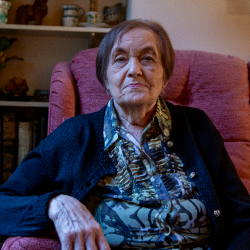
"Cash is very important to me. London pavements are not very comfortable and I can’t leave the house much. I rely on someone else to do my shopping and would not wish to give them a card or a cheque. Cash works perfectly well for both of us."
"I’ve only ever known cash. Even from a young age my father gave me my pocket money (very reluctantly!). It never occurred to me that there might be a time when you can't get cash!"
Noah is a 41-year-old author, advocate and local preacher.
He is a single parent of two daughters and lives in Blackwood in the South Wales Valleys. Noah relies on cash to help budget his finances and feels it is a safer way of spending when facing the fear of being scammed.
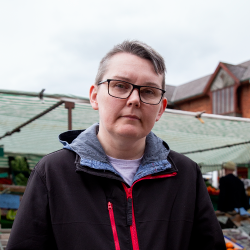
"Cash is an everyday part of life and it has been all of my life, I've never been someone who's just only used card because you can't in so many ways. If you're trying to buy anything outside of a massive commercial environment, you can't as easily with a card. You can’t get something at a reduced rate or buy something at a charity shop or a car boot sale, which is how I live on a low income. That's how I clothe myself, that's how I clothe my children."
"Cash helps me to budget my finances because it's so easy to forget one of the spendings you've made when you're tapping your card. I prefer to have that cash budget with me and know this is what I've got when I'm out."
"I think everyone uses cash but I think without having a real imminent threat of losing it, because it's such an ingrained part of life, people can't quantify it. So they're, "Oh, yeah, cash is there", and you know that old adage, 'you don't know something's there until it's gone'. I think sadly, we're in that position where people don't realise how important it is to have cash because it's been there all their life. They've never known life without it."
Italian-born Fabio is a 47 year old pianist and composer living in London.
Fabio has been busking in London Underground stations for the past 23 years. He has seen the shift from cash to cards, especially since the pandemic. While he’s started accepting card payments, he still prefers cash for its personal connection and simplicity. Fabio feels that digital payments reduce the spontaneity and charm of street performances. For him, cash offers an immediacy and authenticity that card payments cannot replicate.
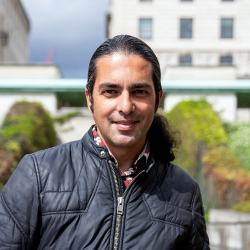
"I've been busking in London since 2001. I don't really like cashless payments, I prefer cash. I prefer to be connected to people than to all these machines. I don't really like the mentality that we have to always be online, always using everything electronically, because it disconnects people."
"The majority of buskers know how to use technology, so they have adapted to the cashless life by using card machines. But there are a group of buskers who don't use much technology and for them it is hard to even book their busking spot online. So it's going to be very, very difficult for them to adapt. I hope they don’t remove cash from society. Otherwise it's like you're killing a group of artists that cannot adapt to the new generation."
"Some buskers started taking card payments four or five years ago. But it took a lot longer for me, until after the pandemic. I didn’t like the idea of having to ask people to pay by card. I don’t think I’ll ever get to the point where I’ll accept card payments only. If cash is there, I will take it. I hope that we’ll never lose cash as I don’t want to become like an electronic busker!"
Mika, 24, is a student living in Sutton Coldfield.
Mika came to the UK from Azerbaijan aged 16 along with her mother. Her asylum process took seven years before she was granted refugee status and during those years, she faced many challenges of having to rely predominantly on cash.
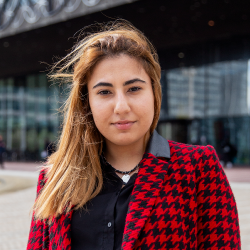
"Over the seven years I spent in the asylum system, I really understood the difficulties of depending entirely on digital payment systems. In my home country, using cash was a much more straightforward and mainly accepted method for managing everyday financial needs".
"With cash, I had immediate access to funds and could easily engage in a wide range of transactions, from buying groceries at a local market to paying for a bus ticket."
"Using cash made me feel safer."
About LINK
LINK is the UK’s Cash Access and ATM Network that connects virtually all the UK’s ATMs and provides communities with access to cash through services such as cashback at retailers’ tills, enhanced post offices and banking hubs.
LINK's network of around 50,000 ATMs connects the country’s payment infrastructure and enables the public to access their money easily, conveniently and safely.
LINK is committed to promoting financial inclusion and protecting free access to cash.
Learn more
ESG at RPC
At its core, ESG is a business-critical issue that transcends borders and industries, underpinning the drive for sustainability and responsible business practices.
In today’s landscape, ESG influences every aspect of business, from corporate governance to environmental impact. At RPC, we recognise that achieving sustainability requires a comprehensive approach that touches all areas of legal practice. We don’t limit our expertise to specific disciplines; instead, we bring together the full breadth of our firm’s capabilities to address your ESG challenges in a cohesive and integrated manner.
Our approach to ESG is rooted in our commitment to Responsible Business. We work proactively with you to go beyond merely meeting today’s standards—preparing you to thrive in the future. Through collaboration, transparency, and shared purpose, we ensure that your business not only addresses the ESG challenges of today but is also well-positioned to lead in the sustainability landscape of tomorrow.

Discover our ESG expertise
Learn moreStay connected and subscribe to our latest insights and views
Subscribe Here

